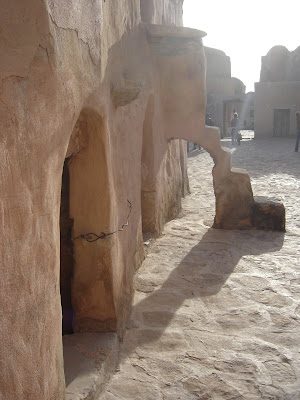 No. 33: Learn a medieval trade
No. 33: Learn a medieval tradeThe first language of Tunisia is Arabic, and I have an exotic stamp in my passport to prove it. I’ve spent a week trekking through rock mountain villages; visiting with weavers and potters; riding a spitting, grumpy camel through the Sahara; driving up and down sand dunes with our turban-wearing guide named BuBar. That last bit was a test of faith in my fellow man. There are no paved roads in this part of Tunisia and BuBar’s idea of a comedy routine is making English women think he’s going to roll our car over a slope. I’ve become well acquainted with my seatbelt.
As Indiana Jones as I’m feeling this week, I’m currently met with a most challenging quest. Standing with two British journalists at 6 am before an early morning safari, we’re at a sleepy café and desperate for coffee. A quick look around at the quiet locals sipping their morning drinks reveals this place specializes in black sludge served in tiny cups.
“Tosh, they don’t do milk,” my fellow traveler Vicki groans from beside me.
This places me in a quandary. See, the second language of Tunisia is French and I’m 75 percent sure I know the phrase that will get us out of this mess and into milky caffeine goodness. But memories of German bakers are holding my tongue.
“Ahem,” I cough at the thick-necked proprietor. “Bonjour monsieur.”
I’m smiling, pleased I’ve gotten those two words out. The waiter is looking unimpressed, his hands spread in front of him on the counter like he’s a blackjack dealer and I can’t decide whether to stay or double down.
“Avez vouz du café au lait?” I state as slowly and clearly as possible. I sound like a learning impaired Audrey Tautou.
He takes a long pause to dry his hands on his red striped apron, before turning with a conceding reply of “Oui.”
I am elated. I am a French genius and global translator. I am an ambassador of goodwill, a beacon of hope for the tongue tied, a provider of coffee for your weak, your tired, your humble masses yearning to drink free.
I want to tell the man merci but am too afraid of what might come out, and I sip gratefully from my mug of light-brown coffee instead.
Our PR organizer Ffion finds us there, sitting in a post-caffeine glaze, and escorts us down a crowded street in Djerba where the noisy alleyways are filled with children mixing spices, men weighing vegetables and a group of older gentlemen arguing over a game that looks like chess but with flat round pieces. I think they call it checkers.
I speed up to get around a trio of goats being led by a barefoot boy wearing a Superman T-shirt, and step into a smoothed plot of land with orange and yellow bowls laid out in pretty rows.
“Parlez vous francais?” a thin man with dark skin and cropped hair asks from behind me.
“No,” I respond. “English.”
“That is good. I speak English. I show you my work and maybe you like.”
He’s motioning for me to follow him into what I can only describe as a cave, a tiny dwelling carved into the rock of the mountains. I look over my shoulder to where Ffion, Bubar and the other journalists are taking pictures of a stack of cone-shaped hats, shrug my shoulders, and follow behind.
The inside of the hut is bigger than I would have expected, lined with shelves filled with hundreds of pieces of oddly shaped pottery. It’s dark in the cave, the space actually dug into the ground so that it’s four feet below land level outside, the only light coming from a series of candles strewn sporadically throughout the place. The floor isn’t a floor, it’s sand.
In the corner is a kiln, but not like any kiln I’ve ever seen at my local JCC. It’s an ancient looking monster, breathing fire and sparks from its mouth, as a short, round man in overalls leans over it with a metal rod, twirling a small plate over the flames.
“My family makes pottery here for more than 100 years. I will show you, then you try,” thin man says. Watching skinny and his partner work is like seeing two eight year olds playing double dutch. Their hands move quickly performing different elements, one using water to make a clay from the sand, the other smoothing that clay with quick flicks of the wrist. They’re able to make lattice patterns with a tiny metal hook, creating a texture that looks like the result of a machine twice the size of this Cave of Wonders we’re currently in.
The short one hands me his pole and in a language I don’t understand begins explaining how to turn my arm and make sure the small bowl he’s just created gets fired on all sides.
Stepping out of the space I blink three times and hold my hand up to shield my eyes, taking care not to drop the tray, three small bowls, and incense burner I’ve just purchased.
“You are from England?” my new friend asks as I walk away.
“No, from America.”
“America?” he asks, the last syllable lilting up in surprise. “America is wonderful place, is very free. One day is my dream to go to America.”
I tell him I agree, and wonder how five minutes with a stranger who doesn’t know the difference between Miami and Michigan could make me more lonesome for my country than eight months with a city of people who spend four weeks out of the year there.


I love it! The part about the cafe was great!
ReplyDeleteWo ist toilette?
ReplyDeleteVous est toilettte?
So close and yet so far. :)